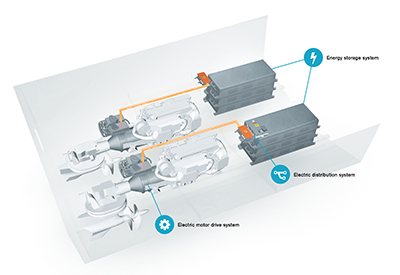VOLVO PENTA UNVEILS HYBRID MARINE PROPULSION CONCEPT

July 3rd, 2018
Designed to enable zero emission running for marine vessels, Volvo Penta has unveiled a hybrid concept for its IPS propulsion system. The electric-only mode allows entry into environmentally sensitive zones, as well as offering enhanced onboard comfort and boat handling characteristics.
Hot on the heels of Volvo Penta’s announcement that it will provide electrified power solutions for both land and sea by 2021, the company has revealed details of a hybrid-powered Inboard Performance System (IPS) concept.
Designed to extend further IPS’s advantage, the hybrid variant will allow boats to operate in the low-and-zero emission zones that are expected to be introduced in the coming years*. The hybrid configuration will also bring additional benefits, including lower noise, vibrations and running costs.
Based on proven Volvo Group technology and experience
The IPS hybrid system is planned initially for the 8-13 liter engine range – suitable for powering vessels such as ferries, pilot and supply boats, as well as yachts. It uses proven hybrid technology first developed within the Volvo Group, which Volvo Penta is now adapting and certifying for marine applications, using its extensive boat propulsion experience.
“A hybrid provides a flexible solution, one that maintains the high efficiency offered by the IPS system and adds the ability to run in zero emission environments,” says Niklas Thulin, Volvo Penta’s Director of Electromobility.
“With full torque from the electric motor available instantly, the boat will maintain the responsiveness and controllability that IPS is famous for in electric-only mode, as well as offering the ability to run at 10 to 12 knots.”
How it works
A clutch and electric motor are added between the engine and the IPS pod. The electric motor is supported by scalable (depending on application needs) Li-ion battery packs that can be charged externally using AC or DC chargers; or recharged using the primary diesel engine. Opening of the clutch allows the boat to run in electric-only mode, and with the clutch closed both diesel and electric power can be used in parallel. In terms of operation, the captain will use the familiar control interfaces of the IPS system, with the addition of new drive modes to choose from.
Scalable design
The modular nature of the battery packs allows customers to tailor the design and performance of both commercial and leisure boats. More battery capacity offers extended electric-only cruising, and – with frequent external charging – the use of smaller diesel engines and lower fuel costs. With the electric motor and batteries maintenance-free – and the diesel engine operating for fewer hours – the cost of servicing should also be noticeably lower. Volvo Penta will continue to support customers in tailoring a prop-to-helm configuration based on the specific application needs.
The parallel hybrid IPS is currently in early stage development, with the system being validated at the company’s test center in Gothenburg, and a test boat planned to enter sea trials in early 2020.
During this process, customer input will play an important element in developing the system for use in a range of marine applications. The hybrid IPS will be available to commercial customers in 2021, followed by a leisure boat option soon after. Over time this system will evolve into more hybrid technologies and all-electric drive variants, as part of Volvo Penta’s commitment to offering customers flexible technical solutions that best meet their needs.



























